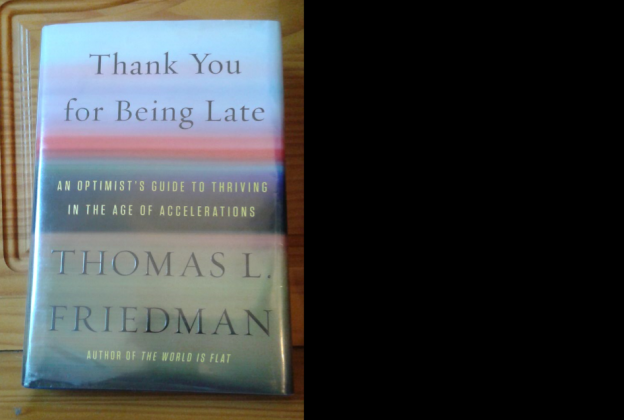I just read Thank You for Being Late: An Optimist’s Guide to Thriving in the Age of Accelerations, by Thomas L. Friedman and man…that was a drag race and I don’t like cars.
Did that turn of phrase make sense? It wouldn’t matter if you were The New York Times Pulitizer Prize-winning columnist, Mr. Friedman. It would matter if you were a high schooler attempting to turn in a research paper; you would be asked to refine, edit, and rethink your choice of words. You would be asked–politely– to be more clear. If you were Friedman, you would be paraded around institutions such as Politics & Prose, the Brookings Institution, and Talks @ Google, for example. Do I sound bitter? I’m not. OK…maybe a little; only because I really should have been reading Religion in Human Evolution by Robert N. Bellah but for some inexplicable reading I sat down with Friedman instead. I guess I needed some light reading after semester.
Thank You for Being Late is an uneven book that should have been edited down to size. Not including acknowledgements, this book runs 453 pages and could have been quite the read if it was a crisp 225 or so. Hell….if it would have been 300 or less pages I might have even recommended reading it. Now: I wouldn’t bother reading this book if I were you. I would pick it up, jot down some of what he references, and then go and read what Friedman read to compile this book. For instance, he references a fascinating paper by Will Steffen et al from the Anthropocene Review from 2015, about myriad ecological stresses that we ignore at our peril.
What is this book about? This book is about the fact that everything is speeding up and because of this, job competition is increasing and “average is over.” Everyone has to keep learning, and improving if they want a shot at the good life. Moreover, in order to tackle the challenges of the 21st century, we have to rekindle and build-up our local communities in a bi-partisan way. We have to be open and not closed.
The best chapter in this book is chapter 3, “Moore’s Law,” and it really is quite a fascinating history regarding the exponential growth of various technologies, such as microchips/integrated circuits/microprocessors, sensors, storage/memory chips, software, and even fiber-optic cables and wireless systems. It never gets old to hear about Gordon Moore’s “law”, the “expectation that the power of microchips would double roughly every two years.” The heroes of this chapter are bigwigs at Intel, Qualcomm, and At&T; Gordon Moore, too, of course. We really are living in an unfathomable time. I’m excited and terrified about the future.
The first 187 pages or so are quite good, albeit with the unfortunate decision to summarize someone else’s work; which is then followed-up with that person’s actual words. This book really should have been edited, and condensed; if only because there are powerful stuff here drowning in wordy superlatives best left on the cutting room floor. Chapter 2, “What the Hell Happened in 2007?” is illuminating on how important that year was. For example, what follows the colon either were created, emerged, or really started to take off and scale in 2007: IBM started to build “Watson”; Apple introduced the iPhone; Google had just bought YouTube and launched Android; Facebook was taking off; Amazon released Kindle; Airbnb was drawn-up; Intel introduced non-silicon materials into microchips; Hadoop began to make ‘big data’ possible; and so on. 2007 was quite remarkable and this was actually a poignant profound chapter, in my opinion.
There are good sections on climate change and biodiversity loss, too. But, Friedman does as Friedman does and uses the term Mother Nature to describe various separate though connected phenomenon; I think for the sake of making many of these ideas stick but that comes across…flat. As flat as the world is now, as Friedman, himself, might say. (Matt Taibbi calls Friedman’s particularities, lets say, as Friedmanese.) Friedman does a good job highlighting what is important but doesn’t really add anything of value himself. Oh, and he builds a platform for a political party that he says is precisely and exactly what Mother Nature would want in a party. I would have appreciated it more if he would have just written: these are political ideas that I support. Nope: he speaks for Mother Nature instead. Weird.
Overall, I don’t recommend reading this book. I would recommend renting it from the library (which I did) and reading the first few chapters because the first few chapters are really fascinating. However, I wouldn’t finish this book especially when there are 130 million books in existence. I finished it because I’m stubborn. Oh, one more thing. Friedman calls the “cloud” the “supernova” for no good reason other than he thinks he is cute and clever, I suppose. Don’t we all? That, in fact, might be the lesson to learn from this book: we should all ask ourselves: do I sound like Thomas Friedman right now? And if so, time to do some yoga and contemplate a better path for yourself. And: edit!
